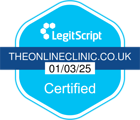Tretinoin
Tretinoin is used for the treatment of acne vulgaris.
Can I buy Tretinoin online?
Tretinoin cream can be prescribed online for certain skin conditions following a consultation via your website with an experienced GP.
What is Tretinoin?
Tretinoin is a cream that can be used on the skin by people with acne vulgaris and melasma. It is prepared as a cream with different strengths (0.05% and 0.1%). The the 0.05% is prescribed for the treatment of acne vulgaris and the 0.1% for the treatment of melasma at The Online Clinic, as a single agent preparation.
Tretinoin is a member of the retinoid class of medicines, which are derived from vitamin A. When applied topically, tretinoin treats acne as it acts by breaking down comedones (whiteheads and blackheads) that form when skin pores and hair follicles become blocked with bacteria, dead skin cells and grease, by decreasing comedone production and by increasing the rate of skin cell turnover thereby forcing comedone extrusion from the skin. Tretinoin also acts as an anti-inflammatory agent.
Tretinoin acts on different levels: it facilitates the removal of pigment in melasma by accelerating the turnover of keratinocytes.
How to use Tretinoin
Your doctor will tell you when, how often, and how much tretinoin to use. Typically, tretinoin is used once a day at bedtime. You may be told to use the medicine less frequently, or stop it temporarily or permanently if you experience skin irritation. The medicine usually takes several (8 to 12) weeks to show best results, so do not stop it when your acne begins to clear up, and contact your doctor if you still have symptoms after 12 weeks.
Gently wash your face (using warm water and a mild soap) and pat dry; then wait for about 20 minutes so the skin is completely dry. Squeeze a small pea-size amount of tretinoin from the tube onto your fingertip and apply a thin layer to the affected skin area. Avoid your eyes, mouth, corners of the nose, mucous membranes, and damaged skin. A moisturiser can be used during the day to prevent or alleviate very dry skin.
Faster and better results are not achieved by using tretinoin more often or in greater amounts. Instead, you may experience skin irritation, with red swollen peeling skin. Wash the medicine off your face, and contact your doctor as you may have to temporarily stop its use.
There are certain precautions you should take when using tretinoin. Your skin may become more vulnerable to extremes of climate, such as cold, wind, and sunlight, causing dryness and burn. Avoid getting sunburnt, using sunbeds, and phototherapy. When outdoors, use a sun screen with a high SPF level and/or wear protective clothing (hat) to shield the treated skin. Additionally, do not use hair removal methods (electrolysis, chemical depilatories, waxing), while using tretinoin.
Your doctor will want to know all the medicines that you take, may take, or recently have taken. It is recommended that you do not use other tretinoin-containing medications (unless to do so by a doctor), and to avoid skin products that can dry or irritate the skin, such as astringents and shaving lotions (toiletries containing alcohol/lime/menthol), medicated soaps and cleaners, cosmetics, hair dyes/perms, and sulphur/resorcinol/salicylic acid-containing products.
Use tretinoin only on the skin, contact a doctor immediately if you swallow it and, if it gets in your eyes, wash them with lots of water. If you forget your bedtime dose, then apply the next dose in the usual amount at the usual time.
Who can use Tretinoin?
Tretinoin may be used by people over the age of 12 years (The Online Clinic treats 18 and over only). It should be used in women who are pregnant only if essential as it can potentially harm the baby, and used with caution in women who are breastfeeding.
Tretinoin cream should not be used if you are allergic to tretinoin or other retinoid medicines, or any of the other ingredients in the medicine. Before using tretinoin, tell your doctor if you have or have had eczema.
Tretinoin side effects
While rare, serious allergic reactions can occur, with symptoms of rash, itching or swelling of the face, tongue or throat, breathing problems, or severe dizziness. Seek immediate medical attention if you have any of these symptoms, or if you experience severe burning or swelling of the skin, or the skin blisters, crusts or discolours.
Some people experience a temporary feeling of warmth or stinging immediately after applying tretinoin cream. Additionally, during the first 2 to 4 weeks of use, the skin may become red, dry, scaly, itchy, and mildly burn, or your acne may worsen. A reduction in these effects usually occurs over time with continued use. Contact your doctor if these effects persist or worsen, as you may need to change the frequency of use or strength of the cream or discontinue it.
GMC registration number: 4524038

Date: 6 February 2024
Next review: 5 February 2026
All UK registered doctors can have their registration checked on
The Medical Register at the GMC website.
Tretinoin Reviews By Our Patients
-
Was very good







